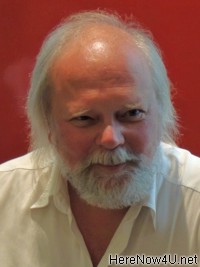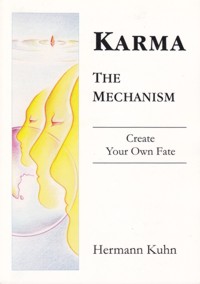Karma is easily associated with reincarnation. Not without reason; - though karmic mechanisms definitely operate in the actual present, they also are placed in the context of successive embodiments. The West often looks upon this model with disdain and without much further consideration relegates it to the domain of oriental fairy tales - usually with a mild ironic smile.
But we easily forget that our precious Western idea of existence is also just a concept. The presumption that life is created from nothing to assume a brief corporal existence, then - at its end - is transferred to another type of body to remain rather eternally in heaven or hell, - this presumption originates in religious beliefs hardly accessible to logic.
Ever since science successfully propagated the idea that only what is physically perceived is permitted to exist, heaven and hell are dismissed. Our life (and our consciousness) was reduced to an accidental play of chemicals that neither exists before the body's birth, nor after its death and therefore could not possibly have any deeper meaning.
Now - every concept - whether originating in the divine, scientifically proven or practically tested - is always only a mental model, a pattern projected onto a set of personal experiences. And these patterns always amplify some parts of the experience while ignoring or reducing the relevance of others.
Unfortunately many of these models exclude entire sections of reality which govern highly important mechanisms of life. It is impossible to discover these missing mechanisms from the inside of a concept with only the help of the concept's tools and logic. And it often is very difficult to even get a notion that something else exists outside the cherished model. As long as we rigidly adhere to one single model, there always is the danger that entire sections of reality are inaccessible to us.
Yet we cannot live without concepts. We need a conscious idea how to successfully handle life. But since no concept is capable of embracing the entire latitude, depth and dynamism of our existence, it doesn't make sense to take the belief in one system as the ground to principally reject the serious examination of others.
Karma and reincarnation are also nothing other than concepts projected onto this world. They are not holy and there certainly are areas in which they are not valid. Yet karma and reincarnation encompass a far broader section of reality than many other (Western) models. They open up experiences and mechanisms other concepts do not believe accessible.
Reincarnation manifests our craving to physically experience all the values, ideas and ideals we carry deep within us. Our present life is a very expression of this craving. What we encounter now IS reincarnation! We ourselves consciously attracted all the circumstances we experience at present. We ourselves created all the challenges, the tension, the impossible situations we confront now so as to bring out the values hidden within us. We did and do create this because we were unable to experience the fulfillment of these aspirations in previous lives.
Not everything we want to experience needs necessarily be regarded as positive in the social context in which we incarnate. It may well set us against norms, break rigid rules, upset ourselves and others, and much more, but nevertheless it is all driven by the same intense desire to manifest those values within us. Some of these values might find success, some might face opposition and become failures and some might die off in the process without even leaving a trace. But this is only one part of the learning process we subject ourselves to. The most important thing in all the actions, attitudes and emotions we create is that we manifest them in the first place, - is that we do not keep them bottled inside us, - is that we express what we feel within us in the physical world.
When we leave our present body, we take with us all the abundance of the experiences gained by these attempts, all the sagacity, the maturity, the sovereignty we accumulated within us. We might even choose to carry detailed memories into our next lives, but this is rare. Most of us favor to enter a new life unencumbered by the recollection of past events.
Death is a highly overrated experience. It is nothing other than leaving our physical body to experience different levels of existence. It is nothing other than what we experience while we are dreaming. When entering the dream-state, we take it as a self-understood fact that we do not take our physical body with us. It remains behind in bed while we take on a 'dream'-body that feels as real as our physical body. And this 'dream'-body often enables us to experience action far more flexible, intense and exciting than our present conditions would ever permit. We also never lose our identity while entering dreams, we always take the 'I' with us, - and we always feel completely normal and natural in our dream-identity while doing the most extraordinary things.
Though we all experience leaving our physical body several times during sleep each night, we usually do not connect our dream-experiences to the mechanism of death. Yet death is also nothing more than our consciousness leaving our physical body. Sure, it appears different because we do not return to this particular physical body and its familiar environment. But then - have we ever cared much about the many 'dream-bodies' we left behind when waking up? Once our consciousness has left one particular level of perception, our awareness becomes so captivated by the new body and the new environment we then experience that we entirely forget our previous frame of reference - irrespective if we have the option of returning to it (dream) or not (death).
And as we were able to retain our identity, character and memories while entering the dream-world, we also take all our identity, character, wisdom and everything we are and learnt with us at our time of death.
The apprehension with which the West looks upon death stems from the idea that our present life is the only one we will ever have and that - if we botch it - we never will get another chance.
This is a good illustration how rigid concepts can limit our scope of life. As long as we believe that this is our only life, we tend to get as much physical excitement out of it as possible. Especially in our youth we focus almost exclusively on the joy our body can give us. We casually presume that older bodies would be less capable of doing so and that any non-material enjoyment would be more difficult to reach. We hardly ever recognize or even hold possible that alternative dimensions of life may bring far more intense thrills and ecstasy.
Unfortunately this exclusive focus on material enjoyment often carries over into our more mature part of life. Instead of recognizing the limited range of material enjoyment and progressing to more satisfying dimensions, we frequently attempt to re-enact particular positive experiences of our youth - often with less and less success. At the end of our life we then may look back in frustration and with the unspoken question what this was all about. Yet though we certainly will have another opportunity (another life) to figure this out, this is missing the point.
The far more interesting question is - where do we go from there? What is our intention after we leave our physical body?
All the values and ideas we were unable to express in our current life will leave an unfulfilled longing at our time of death. This longing has the tendency to make us again choose circumstances that offer the potential of fulfilling this craving.
Yet it is an illusion to hope that our next life will bring the desired satisfaction if we do not actively take concrete steps necessary for fulfilling our aspirations NOW. Only sitting and waiting for something to happen will never produce the desired results - and never in this case means the endless repetition of our present dissatisfying circumstances.
So why not face the challenges we carry within us now? If our next lifetime will confront us with similar circumstances as we currently experience, what makes us hope that we will take up the opportunity then, if we fail to take charge of manifesting our ideas now, - in the very present?
The idea that this is our very first incarnation and that any successive life in a bodily context is re-incarnation, is naïve and illogical. There has been a long chain of lives before this one and there might be an equally long and monotonous chain ahead of us for as long as we continue to avoid manifesting our inner ideals and values.
Now is our point of power. Now is the only point in time when we are able to do something. If we transfer this power to another - future - re-incarnation, we basically surrender the control of our life(s) to a diffuse future that will never arrive.
The fact that the theme of this book triggered your interest is the best indication that materially oriented themes do not engage your full interest any more and that you now are - consciously or subconsciously - searching for other and more rewarding realms.
 Hermann Kuhn
Hermann Kuhn
